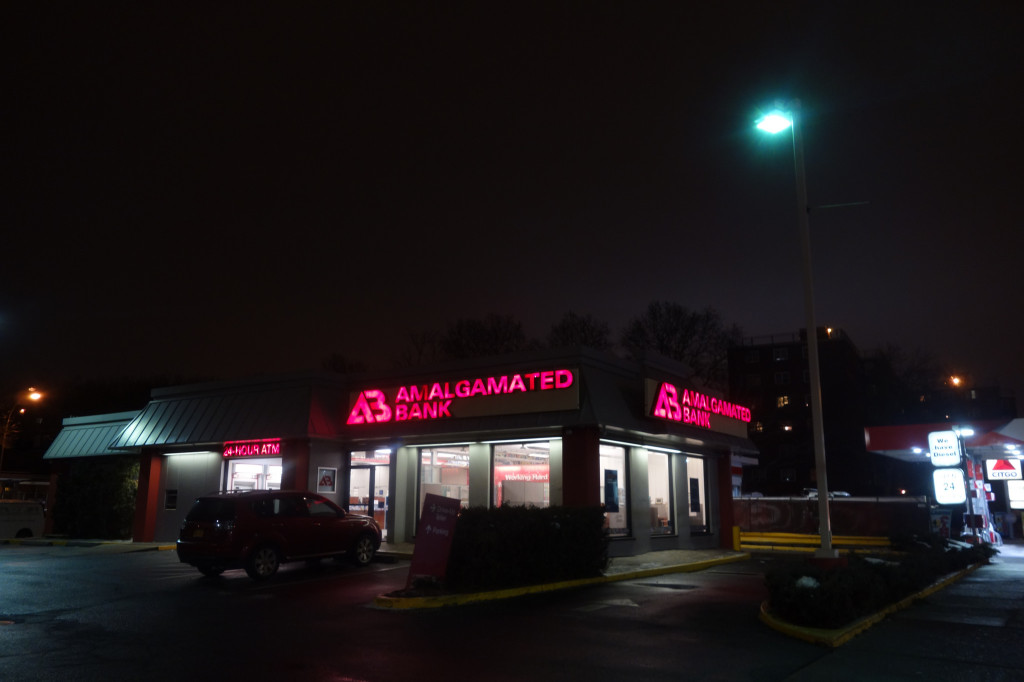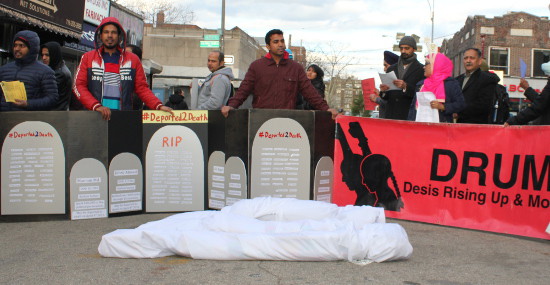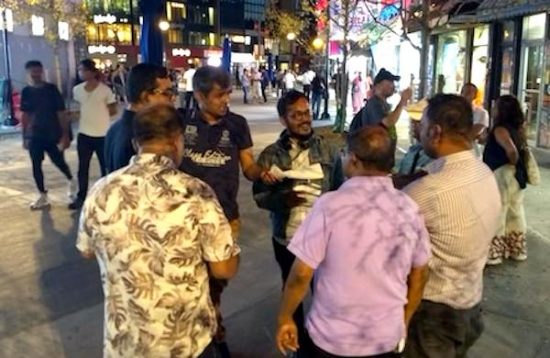For this Syrian baker in Brooklyn, his ingredients are just like old friends — the kind that sit comfortably with you, in both silence and celebration.
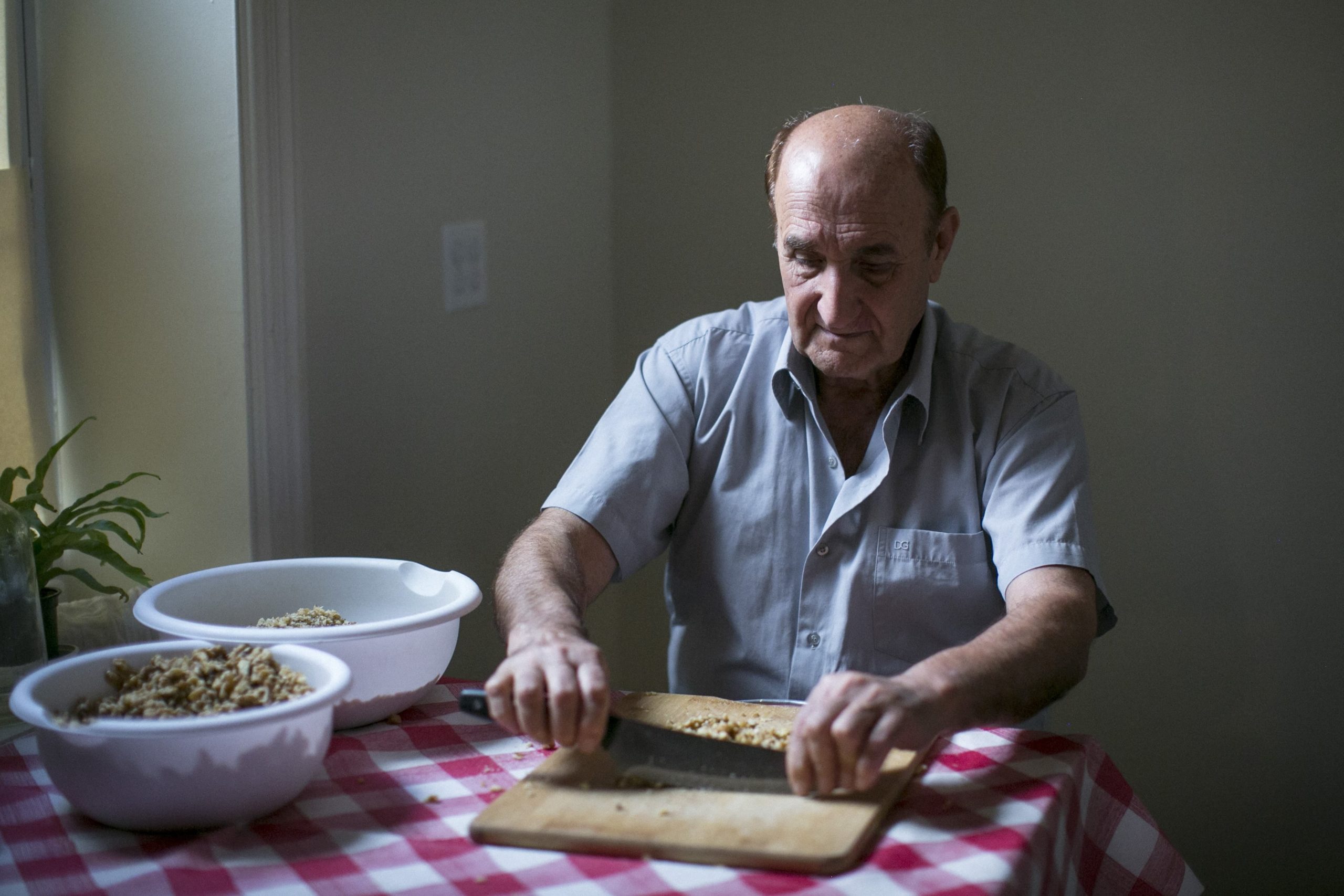
April 9, 2019
The nuts need to take time to love each other,” Marhaf Homsi says.
His knife licks the board as he slices a gathering of walnuts into a small canyon. After a lifetime spent baking, it is here, in this place of cutting up, that he is made whole. At 78 years old—over 60 of those years spent perfecting his craft—Marhaf’s ingredients are like old friends, the kind that slip quietly into the cracks of everyday life, those that when they surround you, feel just like home.
Creating baklava—his signature dessert—is a meticulous process. Spoonfuls of chunky, orange-blossom-infused walnuts are spread between layers of filo, already gleaming with hints of ghee. Before the baklava is put in the oven, Marhaf creates space for the ingredients to simply sit.
“I let them rest, so they can connect.”
A gentle rhythm fills him, as he chops and layers and brushes and pours. Time is a measure he cultivates and makes his own, portioning it out based on what the ingredients need, a process where slowing down is a prerequisite to making his work better—and the waiting, as the baklava puffs to life in the oven, creates space to pause and reflect. In a city that rewards speed, watching Marhaf Homsi bake, then, can feel like an act of faith, a reminder of the wisdom inherent in allowing things to just be, and emerge as they need to.
In mid-2016, Marhaf moved from Hama, Syria, the city he was born and raised in, to Bay Ridge in Brooklyn. With few possessions from the life he left behind, and very few roots in the life he was coming into, he found grounding in what he knew best: baking. The first thing he did when he arrived was to start scoping out existing pastries, exploring each neighborhood for the best spots and trying out the options that different restaurants had to offer. His verdict?
“What they have here is not baklava, I don’t say this to promote myself. There is not much craftsmanship,” Marhaf said.
Marhaf learned to bake from his mother when he was 14 years old in his hometown of Hama. Every holiday, his mother would make tray after tray of sweets—a delight to his 10 siblings and all the relatives that would congregate at their house. Sometimes, their home was so full there wasn’t even room to walk, corridors spilling with cousins and children, their fingers sticky with the last breath of fresh pastry. As Marhaf’s mother grew older, he took over the responsibility for holiday-baking, and soon he was Chief Baker of the Homsi household.
The pursuit of this passion as a career happened by coincidence.
“There was a bakery next to our house, I bought a quarter of it in the beginning. Then I bought half, then three quarters, then all of it. Then it became mine.”
As Marhaf discovered the gaps in his knowledge, he simply found a way to learn them, seeking out and shadowing neighboring bakers, studying their techniques and innovating on his own. Over a period of over 30 years, Marhaf developed and grew his business—Al Kindi Bakery—to a 14-employee operation. He sold an array of delicacies, including ma’amoul, kunafa, croissants, and of course, his famed baklava—the treat that customers would come for miles away to buy.
“Each employee had a specialty—one responsible for grinding the nuts, one for preparing the ma’amoul. We had a whole team dedicated to making the dough as each pastry—baklava, savories, karabeej, round breads—required a different type of dough, with its own unique process.”
Marhaf was the conductor of the dough orchestra—overseeing the team, ensuring the accuracy and consistency of measurements and instructing them on which dough to knead and for how long.
“They escaped… or died… or lived… I don’t know anything about them,” Marhaf replied when asked about what happened to his employees.
“Even at this age, nothing is too difficult to learn. I have to learn, I don’t like failure.”
Upon moving to Brooklyn, the first thing Marhaf was determined to do was restart his bakery business. His awareness of what it took to run a business paired with his determination to begin again, Marhaf, along with the help of his family members, neighbors and his surrounding community, set up Sweet Refuge, an online store to sell his goods.
In February 2017, the New York Times picked up his story, featuring him in their Dining section, a tribute to his craftsmanship and resilience. Marhaf received over a thousand orders in the two weeks following the NYT piece, and he and his wife, Nawal Wardeh, worked day and night, without stopping, to cater to the spike in demand.
Having read the article, I was struck by his perseverance and poeticism, compelled to find a way to help him in any way possible—my thought was simple: he lived in Brooklyn and so did I. There was no reason why we couldn’t find a way to collaborate. Scouring his website, I found his email address and reached out, eager to help him shape his story and share it with the world. Over the course of the summer of 2017, a small team and I created a short promotional video for his business and redesigned and rewrote his website.
Over the months following the piece, however, interest faded and sales declined, as the story was buried and forgotten. Orders thinned out to 1 or 2 trays a week, yet, Marhaf continued to bake, tray after tray—as habit or ritual or a deeper desire to create and connect. Some days, he would go for walks around his home, hoping for new orders to come through while he was gone.
“He just wants as many people as possible to try his baklava. It’s what makes him happy,” his daughter-in-law told us.
At one point during a low period, Marhaf, through a dose of equal parts genius and mischief, decided to take matters into his own hands to fill the gap in demand. Having identified a group of key community members: elderly Lebanese socialites (aka #IRL influencers) in Bay Ridge, Brooklyn, he started doing anonymous box-drops at their houses, stuffed with a sampling of his sweets. Leaving his life’s work at the doorstep of a stranger, Marhaf waited once again—for his generosity to be received, for his gift to be seen, consumed, appreciated.
“No money, no money,” Marhaf repeated when asked about his motivation for baking: “we came here to bake, not beg.”
“In Syria, holidays were all that mattered. The rest was not important.”
Beyond the nostalgia that holidays evoke, these were the seasons that Marhaf lived for as a baker in Hama. Orders were placed weeks in advance of Eid, as wealthy businessmen bought sweets for every member of their family, for their kids, and their kid’s kids—a generous tradition of gift-giving wrapped up in single orders that weighed up to 50 kilos (110lbs). During these times, eight-hour shifts morphed into 16 consecutive hours of labor, the team baking day and night to fulfill the heightened demand.
“Here, in New York, one tray may sell to 100 customers. It’s different.”
As Marhaf adapted to his new environment, he noted the nuances. Where in Syria, one person ordered their weight in pastries, here, one customer bought 2 pieces of baklava. With orders coming in from all across the USA—Florida to Arkansas to California—Marhaf reflected on how few he received in his new home city, New York, despite the population density and concentration of potential customers—Western individualism played out through portion-size and order numbers.
“What I miss most? Companionship, friendship, siblings, nephews, family around you.”
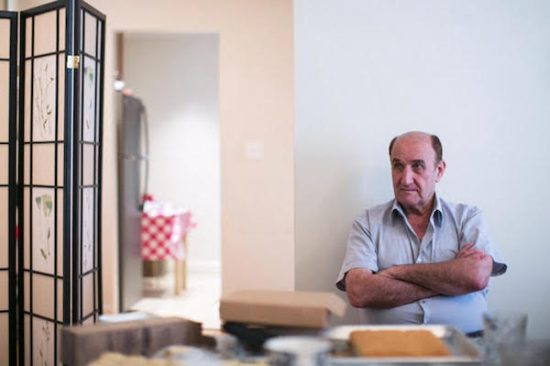
In the absence of that community, Marhaf’s work sustains him.
“Here, people connect over work and income. You have to work. If you don’t work, you can’t live. There is no job I wouldn’t do. I have to work. I can’t not work.”
Marhaf often pauses before speaking, as though he is turning words over in his head as he does dough, kneading his thoughts until they become more palpable.
“One time, a customer told me they tasted love because the sweets melted in her mouth. It’s the love you bring to it. Professions are the same. If you love your profession, you excel at it, if you don’t love it, you don’t.”
Refugee is not a title that Marhaf likes, yet it is often placed upon him, a way of understanding his situation or categorizing him as other. The name of his new business: Sweet Refuge. A clever inversion of power—a way of reclaiming the refugee title and making it his own. Instead of a fleeing from, it becomes a coming home—a refuge, a place to stay, if even for a moment.
This story was written with contributions from David Dini (video) and Jawaher Al Sudairy (interview)
You may also be interested to read these stories:

